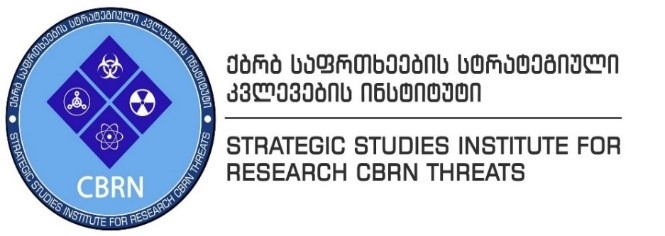

Institute for Strategic Studies of Chemical, Biological, Radiological and Nuclear Hazards is an internal structural unit within the Faculty of Social Sciences at Caucasus International University.
The goals of the institute include: conducting scientific research activities and coordinating efforts to study and analyze strategic asymmetric threats, specifically nuclear, chemical, biological and radiological hazards; Attracting and implementing/facilitating scientific research projects; Studying current political processes related to nuclear, chemical, biological, and radiological hazards; identifying issues and presenting research findings on specific challenges across military, economic, and informational domains; Promoting and coordinating current/planned scientific research projects in the direction of nuclear, chemical, biological and radiological hazards within the framework of the university, facilitating integration of scientific research with the academic process.
The tasks of the Institute for Strategic Studies of Chemical, Biological, Radiological, and Nuclear Hazards are: to study, research, develop and analyze policies related to strategic asymmetric threats, including nuclear, chemical, biological, and radiological hazards; to foster cooperation with international, regional and local organizations, as well as with governmental and non-governmental entities within the scientific community; to host conferences and various scientific and educational events focused on strategic asymmetric threats, as well as to prepare periodicals; to attract grants from various donor organizations in order to support scientific research; to participate in conferences organized by both local and international research institutions; to conduct educational activities.
Head of the Institute for Strategic Studies of Chemical, Biological, Radiological and Nuclear Hazards - Alika Guchua, Doctor of Political Science, Associate Professor at CIU.
Tel: +995 557 960145
E-mail: alika_guchua@ciu.edu.ge
Advisor of the Institute for Strategic Studies of Chemical, Biological, Radiological and Nuclear Hazards - Vakhtang Maisaia, Doctor of Political Science.
E-mail: vakhtang.maisaia@ciu.edu.ge
Scientific Activities
Conferences
- On May 18, 2024, Caucasus International University hosted an international scientific conference - Modern Challenges of International Relations and International Law. The event was co-organized by the Faculty of Social Sciences and Humanities at Caucasus International University, the Institute for Strategic Studies of Chemical, Biological, Radiological, and Nuclear Hazards, CIU Faculty of Law and Jagiellonian University in Krakow, Poland.
- On February 14-15, 2023, a scientific conference "Modern International Security and Weapons of Mass Destruction: Asymmetric Military Challenges and the Regional Security Dilemma was held at Caucasus International University. The event was co-organized by the Institute for Strategic Studies of Chemical, Biological, Radiological, and Nuclear Hazards and the Science and Technology Center of Ukraine (STCU).
Publications:
- In 2024, with the financial support from Caucasus International University, the Institute for Strategic Studies of Chemical, Biological, Radiological, and Nuclear Hazards published the monograph Impact of Artificial Intelligence Technologies on Global Politics. The co-authors of the monograph are: Vakhtang Maisaia, Doctor of Political Science, Alika Guchua, Doctor of Political Science and Tornike Zedelashvili, Doctor of Political Science.
The book covers significant AI technological and political aspects, including the fundamentals of AI, machine learning, deep learning, neural networks, and natural language processing. It also explores chatbot development, AI strategies of various countries, recent political-technological advancements, and the AI capabilities of both leading and developing nations. Additionally, the book provides insights and recommendations on preventing attacks using AI technologies in both physical and cyberspace, examines the capabilities available to aggressor states and non-state actors, and discusses the AI technologies utilized in the Russia-Ukraine war, etc.
- In 2023, the Institute for Strategic Studies of Chemical, Biological, Radiological and Nuclear Hazards, with the financial support of the Faculty of Social Sciences and Humanities at Caucasus International University, published the book - A Factor of Military Conflicts and Nuclear Security in the 21st Century by Gorda Ghibradze, Doctor of Political Science. It is available in both Georgian and English languages.
The book addresses the issue of nuclear security, regarded as one of the most critical topics in the modern world, especially following the recent developments in Ukraine. Security concerns are tied to the establishment of a new world order and the contemporary challenges facing the global community nowadays. Ongoing military conflicts are examined as significant threats to the modern international security system. The book also examines the concept of collective security, which is viewed as the central mechanism for maintaining global peace and stability. It distinguishes three dimensions of international security: political, military, and informational, discussing these within the framework of the “soft power” theory. Additionally, the author analyzes the role of nuclear deterrence, emphasizing its fundamental importance in creating a secure global environment.
- In 2022, the Institute for Strategic Studies of Chemical, Biological, Radiological and Nuclear Hazards published the monograph The Century of Digital Technologies and Contemporary International Political Challenges of Cyber Security with the financial support of Caucasus International University.
Scientific Grant
- In November 2022, the Institute for Strategic Studies of Chemical, Biological, Radiological and Nuclear Hazards of the Faculty of Social Sciences at Caucasus International University received a scientific research grant: STCU PROJECT 9609A – CURRENT LETTER L01. which envisages organizing a conference, publishing a scientific-research monograph and conducting research on nuclear, chemical, radiological and biological safety issues.